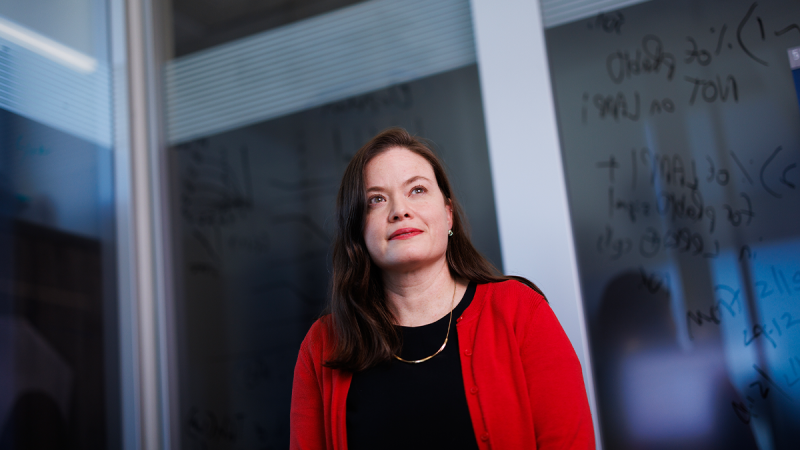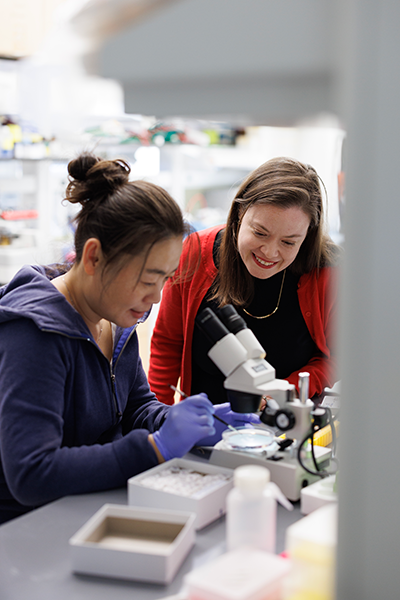
The Fragile Future of American Science
On February 7, 2025, the National Institutes of Health announced a cap of 15% on reimbursement of Facilities & Administration (F&A) research grant costs, which cover equipment and facilities, maintenance and compliance, data processing, and many other essential needs that make research possible. The proposed cap could mean an estimated loss of almost $200 million annually in research funding at Duke and significantly hinder or halt scientific and biomedical research in many critical areas. The order is currently on hold pending legal review, but the situation remains fluid and uncertain, and review of federal research grants has slowed dramatically.
Laurie H. Sanders, PhD, associate professor in neurology and pathology, conducts research on Parkinson’s disease. Her lab has developed a method, based on mitochondrial DNA damage, that can detect Parkinson’s disease in its early stages with a simple blood test. Her research has the potential not only to enable early diagnosis and intervention before significant neurological damage occurs, but also to help identify therapeutic targets to reverse or halt damaged mitochondrial DNA and the disease process. Parkinson’s disease, a progressive age-related brain disorder, afflicts 10 million people worldwide and is the second-most common neurodegenerative disease after Alzheimer’s.
What’s the status of your research now?
Sanders: Obviously, we're really excited about our initial research and the importance of being able to differentiate very early on between people with Parkinson's disease and people without. But this is just the beginning. While I would consider it a major advance, we still have a lot to do.
For example, we need to learn how these biomarkers change over time. In order to scale this up for clinical trials, we need to know how these biomarkers will change over the lifespan of a clinical trial. We also want to know whether these same changes to mtDNA are involved in related conditions like ALS and Huntington’s disease. And we want to understand what’s driving DNA damage in the first place, because then we might be able to target that process with new therapeutics.
So there are questions yet to be answered, and we're excited to continue working to answer them and develop new therapies for Parkinson’s. But we can’t do it alone. My current grant ends in August. I’ve submitted a grant proposal to continue our work, but right now they’re not even reviewing grants, much less approving them.
We do basic science, but I always tell my lab, “We don't work on an esoteric problem. We do this because there are real people living with the disease right now.” Our work is always with an eye toward translation and ultimately to benefit patients. We’ve done years of basic science and made great progress, and we’re eager to carry it forward.
What’s your greatest fear if NIH funding is significantly cut?
Sanders: My biggest concern is not for myself. It's for my trainees. It's for the next generation of scientists. Looking into the face of this, how do we continue the momentum we’ve built? How do we continue our training? How do we encourage them?
I have some of the best, most talented scientists in my lab, and I will fight tooth and nail to hold on to them as long as I possibly can. All the other PI’s are doing the same. But if things continue as they are, there's going to come a point where we won’t be able to do that. We will lose them. Where are they going to go? What will happen to science? We will lose them and their careers and all the discoveries and advances they will make in the years to come.
My fear is that we're going to lose an entire generation of scientists. That's what's at risk.

How important is Facilities and Administration (F&A) support to your work?
You literally cannot do science without F&A. It covers the resources we use to make a lab run. We have a lot of equipment that is essential for conducting science. We have amazing people who facilitate the removal of hazardous waste, who maintain and repair equipment, who manage grants, who ensure safety and compliance. And our amazing research cores at Duke enable us to do cutting-edge science. F&A makes all those things possible. Every time we need to use a confocal microscope, for example, that's F&A. It touches so much of what we do.
What’s the bottom line for what the proposed cuts would do to your research on Parkinson’s disease?
“Devastating” doesn’t begin to capture it. It’s much deeper than that. This research is my professional passion, but it’s also personal: my mother has Parkinson’s. I am hardly alone in having close family and friends who are afflicted by this terrible, terrible disease. People are suffering now, and every day we can continue to work and move closer to new treatments and a cure matters.
We are trying as hard as we can to make a difference. I think there’s value in that. When you take that away, hope disappears. And when hope disappears, the rest falls apart. We can’t let that happen.
Sanders’s research is funded by the National Institutes of Health, the Michael J. Fox Foundation for Parkinson’s Research, and other public and private sources. Her lab includes one postdoctoral scholar, three graduate students, three visiting scholars, three technicians, and 13 undergraduates.
Dave Hart is the director of editorial services in the School of Medicine’s Office of Strategic Communications
Photos and video by Eamon Queeney, assistant director for multimedia and creative in the Office of Strategic Communications
